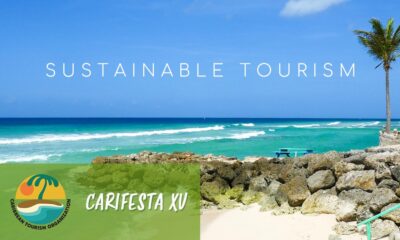Georgetown, Guyana – April 02, 2025 – Increasing security concerns across the Caribbean set the stage for an experts’ meeting in Guyana on the Women, Peace, and Security (WPS) agenda. Bringing together regional stakeholders and international specialists, the meeting focused on developing National and Regional Action Plans that will strengthen institutional responses, address gender-based violence, and enhance women’s role in peace and security efforts.
The hybrid two-day convening was hosted by the British High Commission in partnership with UN Women and Our Secure Future, and brought together key stakeholders from Guyana, Trinidad and Tobago, and Barbados to drive the implementation of a Regional WPS Approach in the Caribbean and National Action Plans (NAP) for each country.
A WPS NAP is a country’s strategic framework to implement the United Nations Security Council Resolution 1325, which advocates for the protection and inclusion of women in peace and security efforts. Each NAP is tailored to address specific security challenges within a country, ensuring that women and girls are integral to conflict prevention, crisis response, and recovery processes. At both national and regional levels, WPS action plans provide structured interventions to combat violence, strengthen institutional frameworks, and enhance community resilience.
A WPS NAP for Guyana and other Caribbean nations presents a strategic opportunity to address key security issues facing women and vulnerable groups in the country. By identifying gaps in policy and institutional responses, the NAP can serve as a roadmap for building safer communities. In the region, Trinidad and Tobago has already adopted a WPS NAP, which took three years to develop and involved extensive stakeholder engagement.
H.E. UK Jane Miller British High Commissioner in Georgetown, said: “An important part of the WPS agenda is thinking about the issues we have in our countries and how the agenda can help us. WPS is not talking about women as victims or vulnerable, even though sometimes they are, but women as being part of the solutions. How can women be brought to the centre of conversations? It took Trinidad and Tobago just about three years to launch their NAP and that sounds about right because effective consultation takes time. Bringing women into the centre of problem solving is not just the right thing to do, it is also the more effective way of finding solutions.”
just about three years to launch their NAP and that sounds about right because effective consultation takes time. Bringing women into the centre of problem solving is not just the right thing to do, it is also the more effective way of finding solutions.”
Sahana Dharmapuri, Vice President of Our Secure Future spoke on the need for strategic partnerships and a regional approach saying: “We want to do things regionally because it goes back to the principle that if we work together, we can accomplish great things. The discussion today is building on that—fostering regional sharing, ideas, and coordination—which is unique. We do not often get the opportunity to share across countries in the Women, Peace, and Security (WPS) agenda. Capturing what women are saying about peace and security in their countries and sharing it with the global community highlights its global importance.”
Je’nille Maraj, Planning and Coordination Specialist at UN Women Multi-Country Office – Caribbean provided an overview of the Caribbean’s WPS progress. Ms Maraj said: “This is a moment to examine the WPS agenda and have the conversations we are having to use the WPS Agenda to address social norms that impact us. In Trinidad and Tobago, the conversation started off with a small group of like-minded people, including CARICOM Assistant Secretary General Elizabeth Solomon, very similar to what is happening in this room. We thought about how is this relevant to Trinidad and Tobago, who should we have dialogues with and we sought out strategic partners. The Government took on their own commitment to take a note to Cabinet. This was bolstered by the NAP Academy in partnership with Our Secure Future. We also held different meetings with civil society.
“UN Women bridged some of the gaps and helped some of these conversations to happen. Many countries in the Caribbean are taking significant strides to address these issues and it is a good moment for all of us to push through,” Ms. Maraj stressed.
Key government representatives from Gender and Child Affairs, Office of the Prime Minister, Trinidad and Tobago were on hand to share an overview of their experience and the rationale for launching the action plan. Kurt Meyer, Permanent Secretary in the Office of the Prime Minister said: “While we know that everyone is affected by insecurity, women, girls, men and boys often experience insecurity and violence differently. The WPS agenda is critical for achieving sustainable peace. Research indicates that peace agreements are 35% more likely to last at least 15 years when women participate in negotiations. By ensuring women’s inclusion and protection, WPS strengthens societies, promotes human rights, and contributes to long-term stability and security.”
Mirsad Jacevic, a global WPS NAP expert who has supported governments in developing more than 100 action plans worldwide, emphasised the importance of the process during the meeting saying: “The development of a WPS National Action Plan is not just a policy exercise—what is even more important is how we get there. The stakeholders we bring together, civil society – whose role is absolutely critical in shaping sustainable security policies, the partnerships we build, and the sustained commitment we foster will determine the success of the plan and its impact on communities.”
Meeting Highlights
The WPS activities started on March 26, 2025, with a Welcome Reception at the British High Commission Residence, where H.E. Jane Miller OBE, British High Commissioner to Guyana and Ms. Elizabeth Solomon, CARICOM Assistant Secretary-General for Foreign Relations, delivered opening remarks. A fireside chat followed, featuring prominent WPS experts Mirsad Jacevic and Sahana Dharmapuri, along with Delfina Garcia Hamilton, UN Women Consultant for the Coordination of the Governance Programme on Women, Peace, and Humanitarian Security.
On March 27, the High-Level Experts Meeting focused on discussions that set the stage for actionable steps in integrating WPS across national and regional frameworks and on the progress and challenges of implementing WPS policies.
A multi-stakeholder team was in attendance as part of the dialogues: CARICOM Assistant Secretary General, Elizabeth Solomon, along with representatives from Guyana’s Ministry of Public Works, Ministry of Human Services and Social Security, Ministry of Legal Affairs and Attorney General’s Chambers, Ministry of Foreign Affairs and International Cooperation, and Ministry of Amerindian Affairs. Other participating officials included representatives from the Trinidad and Tobago Gender and Child Affairs Division, Office of the Prime Minister and the Coalition of Domestic Violence and the Office of the Attorney General and Ministry of Legal Affairs in Barbados.


 Bahamas News1 week ago
Bahamas News1 week ago
 Health1 week ago
Health1 week ago
 News6 days ago
News6 days ago
 Caribbean News2 days ago
Caribbean News2 days ago
























